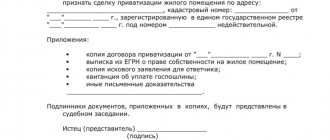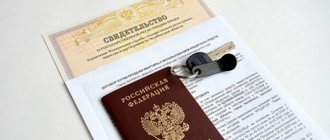Home / Housing disputes / How many times can you participate in privatization
The state gives the right to obtain housing completely free of charge and legally. No, we are not talking about buying and selling or renting an apartment. There is a very profitable and simple procedure called privatization. But at the same time, the right to receive housing has a number of restrictions - a person can take advantage of the attempt to privatize an apartment or house only once in his life.
True, there are exceptions here too, to which close attention should be focused. How many times can you take part in the privatization of residential premises? Who can take advantage of a second chance? We will talk about this below in detail.
✅ Is it possible to participate in privatization a second time?
Let's start with the fact that privatization is available to any capable citizen of our country.
The number of attempts is limited - the applicant has the right to privatize an apartment once in his life (Article 11 of Federal Law No. 1541-1 “On Privatization...” dated 07/04/1991). This means that repeating the procedure with another municipal housing will become impossible - the person will simply be denied registration.
The question arises: is it possible to bypass this restriction and take part in privatization a second time? It is possible, but only if there is a good reason. For example, due to the deprivatization of residential premises, this is a forced process, the reverse of privatization. Or, simply, declaring the deal invalid and returning previously privatized housing to the city . Such a procedure is possible only through the court and if there are serious grounds. Let's analyze the life situation.
Example: The Sokolov family occupied a municipal apartment for 7 years. Subsequently, the residents decided to privatize the housing. The procedure was successful, but during the process the interests of one of the family members, a minor, were violated. Violations were identified jointly with the guardianship authorities after the completion of the transaction. But this did not stop the head of the family from filing a claim in court to declare the privatization invalid. The demand was satisfied, since it was established that the child did not receive his due share in the apartment. The apartment was deprivatized, and all members of the Sokolov family received the right to participate in the transfer of housing ownership for the second time.
The example clearly shows that despite the exhaustion of the attempt for free privatization, people received a chance to participate in the procedure again. Does this mean that such a right is available to everyone? Of course not!
There is also the opposite situation - say, if privatization was carried out according to all the rules, but the citizen decided to return the apartment to the state of his own free will - this is deprivatization , the attempt is considered used. A person will not be able to use the right to the procedure a second time. Therefore, you need to approach the procedure wisely, calculate taxes in advance and plan the further disposal of your housing.
Legislative basis
So, let's figure out whether it is possible to participate in privatization a second time?
This process is regulated by a wide range of legal acts, each of which has different legal force.
Some of them:
- Law of the Russian Federation No. 1541-1 “On the privatization of housing stock in the Russian Federation” dated July 4, 1991.
- Housing Code of the Russian Federation, section No. 4.
- Land Code of the Russian Federation.
- Civil Code of the Russian Federation.
- Government Decree of January 28, 2006.
✅ Exceptions
So, the right to re-privatization in 2021 belongs to persons who challenged the first procedure in court and achieved its cancellation. In addition, a number of citizens have the right to re-participate in the procedure. It doesn't matter whether they refused the previous operation or not.
List of exceptions:
- Minors (under 18 years old)
They can always take part in the privatization of an apartment a second time. The main condition is the right to such a transaction. Conventionally, if a child participated in the procedure for the first time together with his parents, and after reaching 18 years of age wants to re-register ownership of a new home, he cannot be refused. We remind you that residential premises transferred to citizens on the basis of a social tenancy agreement or warrant are subject to privatization.
- Lost housing
This includes persons who have lost privatized housing due to man-made disasters, natural disasters, terrorist attacks and other unfavorable factors. If those who have lost their housing have nowhere else to live, they have the right to repeat the procedure, but in a different apartment.
And again a life situation.
Example: Gladenko V.A. lived in municipal housing under a social tenancy agreement, and then privatized it. But soon misfortune struck the region - the house in which Gladenko’s apartment was located was destroyed by a mountain landslide. The man himself was not injured, but lost some of his belongings and housing. The state provided assistance to the victims - in particular, Gladenko received compensation. At the same time, the man was allocated a municipal apartment in a neighboring city on the basis of a social tenancy agreement. After living there for a couple of years, Gladenko applied for the privatization of housing - again. The man justified his actions with a document about the loss of the previous re-registered housing due to a man-made disaster (landslide). The application was granted and Gladenko was able to complete the privatization of the municipal apartment. Thus, the repeated attempt to transfer public housing into ownership was an exception to the general rules, but was fully justified and legal.
- Those resettled from the North and former republics of the USSR
An important condition for the last category is to return previously privatized real estate to the former owner (the municipality). In return, the state will allow you to use the repeat procedure completely free of charge. However, if the privatized housing has already been sold, donated or bequeathed, secondary registration will become impossible.
- Participants of the paid procedure
There are two types of privatization: paid and free. Citizens of our country have the right to use the free procedure once during their lifetime. For comparison, paid privatization is not limited to attempts - if you have money, you can buy municipal housing at its cadastral value. Participation in a paid transaction does not cancel an attempt to re-register a living space free of charge.
Deprivatization
What is it? Voluntary abandonment of one’s own apartment is practiced in most cases due to family conflicts - when there is a need to “exclude” one of the owners. For example, previously the son-in-law, the daughter’s husband, participated in the procedure. But the couple separated some time later.
In order to purchase premises at the cadastral price, businessmen need to enter into a lease agreement with the local administration for a period of 3 years or more. You can try to purchase some state real estate at special auctions, but not at cadastral value, but at market value, which is usually 10-15% higher.
✅ How many apartments can one person privatize?
Federal law allows one person or several people to re-register an apartment at the same time. The first case is registration of housing in sole ownership, and the second - in shared ownership. This begs the question, is it possible to privatize an apartment for one person if he already owns another property?
Expert opinion
Semyon Frolov
Lawyer. 7 years of experience. Specialization: family, inheritance, housing law.
It is impossible to answer the question right away - there are many examples of both approval and refusal by the authorities. General rule: privatization applies to one residential premises, and if children are involved in the procedure again - to a second housing or a share in it .
Tenants of municipal housing under a social tenancy agreement can privatize an apartment provided they have not participated in the procedure until now. Consequently, any refusal to privatize, even if a person has other housing, will be unfounded.
But on the other hand, if a person has personal property, but still lives in a municipal apartment and wants to register it as his own, this is a reason to terminate the social tenancy agreement. Such cases do occur and the administration’s actions will be considered justified. Especially with a shortage of social housing for low-income categories of the population. Naturally, if the contract is not terminated and the employer applies for privatization, he is unlikely to be refused.
Arbitrage practice
Deprivatization claims are often considered by the courts. The plaintiffs are the apartment owners. For example, one citizen appealed to the court to terminate the privatization agreement. Her husband and son did not sign the agreement. The husband did not sign the document for unknown reasons, the son did not sign because he was in the army. He did not agree to privatization. The court recognized these arguments as valid and granted the plaintiff's request.
This example, like others, shows the possibility of deprivatization only if there is evidence of a violation of the law.
Here is the judicial practice on invalidating privatization.
✅ Which housing cannot be privatized even for the second time?
Before you become a home owner, you need to know its status. It is quite possible that the apartment cannot be transferred to individuals - it will not be possible to register it as private property even if you try again.
It is prohibited to privatize:
- service housing (with a number of exceptions);
- dormitories;
- housing located in closed towns (for example, military);
- emergency facilities.
The last three categories are not subject to free privatization in any form. Service apartments, although rarely, are privatized. The main condition is the consent of the owner of such housing. For example, if the department gives the go-ahead, an employee of the organization will be able to submit documents for the transfer of a company apartment. But, we repeat, only with the consent of the department and only if there are compelling reasons.
Basic Concepts
- Privatization. A set of actions aimed at the official re-registration of property rights from a state or municipal entity to an individual or legal entity on a free or paid basis, depending on the characteristics of the privatization object and the legislative nuances of this process.
- Deprivatization is a return to the original position that arose as a result of privatization. In fact, it is the process of returning the privatization object to the previous owner (municipal or state entity). Possible only if there are legal grounds and only through legal proceedings.
✅ How to take part in privatization again?
The first participation in the procedure does not cause any particular difficulties, especially since we have already described the step-by-step algorithm in our previous articles. You can check out:
“How to privatize an apartment, housing?”
“What documents are needed to privatize an apartment?”
“How to privatize land under a private house?”.
Re-privatization is not much different. The main thing is to adhere to the established procedure and provide a complete package of documents. Let's start with step-by-step instructions.









